 The Cliff's Edge (Bess Crawford #13) by Charles Todd
The Cliff's Edge (Bess Crawford #13) by Charles Todd Format: eARC
Source: supplied by publisher via Edelweiss
Formats available: hardcover, paperback, large print, ebook, audiobook
Genres: historical fiction, historical mystery, mystery, World War I
Series: Bess Crawford #13
Pages: 320
Published by William Morrow on February 14, 2023
Purchasing Info: Author's Website, Publisher's Website, Amazon, Barnes & Noble, Kobo, Bookshop.org, Better World Books
Goodreads
In the aftermath of World War I, nurse Bess Crawford is caught in a deadly feud between two families in this thirteenth book in the beloved mystery series from New York Times bestselling author Charles Todd. Restless and uncertain of her future in the wake of World War I, former battlefield nurse Bess Crawford agrees to travel to Yorkshire to help a friend of her cousin Melinda through surgery. But circumstances change suddenly when news of a terrible accident reaches them. Bess agrees to go to isolated Scarfdale and the Neville family, where one man has been killed and another gravely injured. The police are asking questions, and Bess is quickly drawn into the fray as two once close families take sides, even as they are forced to remain in the same house until the inquest is completed.
When another tragedy strikes, the police are ready to make an arrest. Bess struggles to keep order as tensions rise and shots are fired. What dark truth is behind these deaths? And what about the tale of an older murder--one that doesn't seem to have anything to do with the Nevilles? Bess is unaware that when she passes the story on to Cousin Melinda, she will set in motion a revelation with the potential to change the lives of those she loves most--her parents, and her dearest friend, Simon Brandon...
My Review:
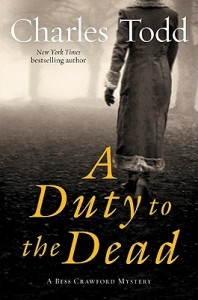 The cliff’s edge of the title is both literal and figurative in this 13th entry in the Bess Crawford series.
The cliff’s edge of the title is both literal and figurative in this 13th entry in the Bess Crawford series.
Former battlefield nurse Bess Crawford finds herself in Yorkshire in her latest attempt to put off making firm decisions about what she will do now that her war is over. While she has resigned from QAIMNS, (Queen Alexandra’s Imperial Military Nursing Service), that itself was out of a sense of duty. She has a secured future, whether it’s one she wants or not. Bess’ dilemma is either that she does not want the future that would have been hers if there had never been a war – or more likely that she either doesn’t want to give up the freedom and purpose that came with her wartime service or believes that what she really wants is not possible for her.
Or perhaps that should be “who” she wants. Or all of the above, wrapped in a great big ball of angst, recriminations and regrets.
Her cousin Melinda asked her to see Lady Beatrice through her gallbladder surgery. Lady Beatrice asked her to go to Scarfdale to make sure that her adult godson was alive after a terrible accident and to help in any way that she could – as well as send back a great deal more information than was supplied in the initial, alarming telegram.
When Bess arrives in Scarfdale she learns all about that cliff’s edge. The edge that two men fell over, or were pushed over, or pulled each other over. One man is dead under these rather murky circumstances, while the other is alive, severely injured, and suspected of the other’s murder.
While Bess’ first responsibility is to her new patient, and her second to Lady Beatrice, still recovering at her home, as usual Bess can’t stop herself from becoming at least curious if not downright involved in the mysteries and tensions that swirl around the house AND the village that depends upon it.
The family and ‘friends’ that had gathered in the house clearly can’t stand each other. The local police seem all too willing to rush the survivor to judgment for reasons that no one is willing to tell a stranger – namely Bess.
And the injured survivor is not in nearly as desperate straits as first appeared. It will be up to Bess to learn what she can – and protect whom she feels she must – in order to bring this thorny case to some kind of conclusion.
Preferably without bringing too many others, including Bess herself, to theirs.
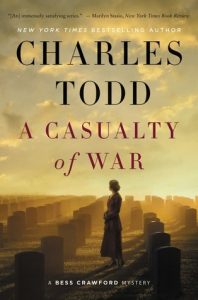 Escape Rating B-: As much as I have enjoyed this series, I believe that it is time for it to come to an end unless it makes a major change in direction. Because Bess has been in limbo for several entries now – at least since book 10, A Forgotten Place and perhaps as long ago as book 9, A Casualty of War. That limbo that makes sense in her circumstances – but her limbo of indecision has sunk into a slough of despond and it feels like it’s simply time for her to get on with her life.
Escape Rating B-: As much as I have enjoyed this series, I believe that it is time for it to come to an end unless it makes a major change in direction. Because Bess has been in limbo for several entries now – at least since book 10, A Forgotten Place and perhaps as long ago as book 9, A Casualty of War. That limbo that makes sense in her circumstances – but her limbo of indecision has sunk into a slough of despond and it feels like it’s simply time for her to get on with her life.
But first she has to decide what that life is going to be, which means she needs to come to a whole bunch of resolutions that may be outside of her control.
What made Bess such a terrific choice of protagonist back in her first adventure, A Duty to the Dead, has reached a kind of expiration date now that the war is over. As a battlefield nurse, Bess had agency, responsibility and purpose. It was necessary for her to be able to think for herself, do for herself, and take charge of her own actions. That her sense of responsibility and inability to leave a puzzle unsolved led her into investigating murder worked intensely well.
But her war is over, she’s resigned from the service. She’s no longer in that position of independence and agency and looking for a new purpose. It stretches the long arm of coincidence – or perhaps that’s the willing suspension of disbelief – that in her decision-making paralysis about the shape of her post-war life she keeps tripping over and into murder investigations one after another – which feels like a bridge too far.
She could return to nursing, in a hospital or in private service, and perhaps run across more such mysteries among her duties. She could become a private investigator as Maisie Dobbs has done, but it seems less likely. Or she could marry. And that’s where Bess’ personal dilemma runs headlong into this rather murky mess of a case.
Because Bess is angsting over the state of her relationship with her father’s aide-de-camp Simon Brandon. Not that their relationship has ever been romantic. When Simon first entered her life, he was fourteen and on the run from some mysterious fate or abusive situation and Bess was still a child. But they’ve both grown up and Bess has come to see Simon in a different light while Simon seems to have distanced himself over something Bess said or did and won’t either acknowledge that distance or explain it.
 So Bess is in Yorkshire in the midst of this case, which is quite a muddle that doesn’t seem much clearer at its end. Not that the cause of the whole thing isn’t found, but rather that the solution isn’t terribly cathartic and doesn’t seem to resolve much of the surrounding tension.
So Bess is in Yorkshire in the midst of this case, which is quite a muddle that doesn’t seem much clearer at its end. Not that the cause of the whole thing isn’t found, but rather that the solution isn’t terribly cathartic and doesn’t seem to resolve much of the surrounding tension.
What it does do is re-open the situation that brought Simon Brandon to Colonel Crawford’s door and regiment so many years ago – even if Simon is not yet aware of it when The Cliff’s Edge ends. But that ending does give me hope that Simon’s past desperation, Bess’ present angst and the question of both of their futures will finally be resolved in the next book in the series.

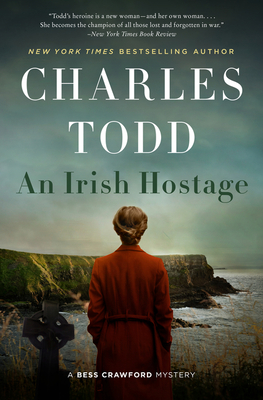 An Irish Hostage (Bess Crawford #12) by
An Irish Hostage (Bess Crawford #12) by  Escape Rating A-: The story in An Irish Hostage feels close and tight, and that’s probably the way it should be. There are huge issues on the horizon, and in the story, and most of them are too big for Bess to solve. She’s stuck, inside tiny, hostile Killeighbeg, caught in the web of the Flynn household, and trapped entirely too often inside her own head.
Escape Rating A-: The story in An Irish Hostage feels close and tight, and that’s probably the way it should be. There are huge issues on the horizon, and in the story, and most of them are too big for Bess to solve. She’s stuck, inside tiny, hostile Killeighbeg, caught in the web of the Flynn household, and trapped entirely too often inside her own head. A Hanging at Dawn by
A Hanging at Dawn by 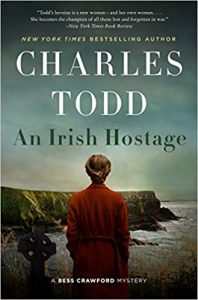 And even though, or perhaps especially because, in this particular case it’s the threat of the power of the Raj that brings justice for Simon, it’s also true that the same threat would have worked just as well if he’d been guilty. The only difference is that if he had been guilty the Crawfords would never have raised the threat in the first place.
And even though, or perhaps especially because, in this particular case it’s the threat of the power of the Raj that brings justice for Simon, it’s also true that the same threat would have worked just as well if he’d been guilty. The only difference is that if he had been guilty the Crawfords would never have raised the threat in the first place.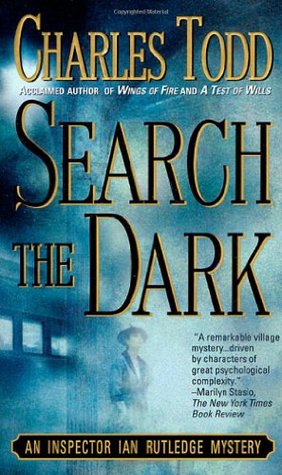 Search the Dark (Inspector Ian Rutledge, #3) by
Search the Dark (Inspector Ian Rutledge, #3) by 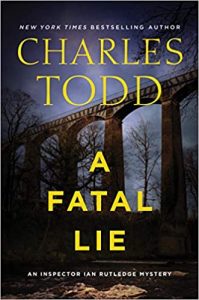 I picked this up because I was looking for a comfort read, as paradoxical as it is to find murder comfortable. Of course, I don’t find actual murder comfortable at all, but murder mysteries have to follow certain conventions – a body, a detective, a suspect, a few tasty red herrings – and I find that quite comfortable. I ended up here with Inspector Ian Rutledge because I just picked up a new book in the series (
I picked this up because I was looking for a comfort read, as paradoxical as it is to find murder comfortable. Of course, I don’t find actual murder comfortable at all, but murder mysteries have to follow certain conventions – a body, a detective, a suspect, a few tasty red herrings – and I find that quite comfortable. I ended up here with Inspector Ian Rutledge because I just picked up a new book in the series ( But what makes this series work is the dogged and tormented character of Inspector Ian Rutledge. He’s often caught between knowing that he’s right and fearing that he’s wrong. He’s afraid at every turn that he’ll fail, and that the result of that failure will condemn both an innocent and himself. He carries the seeds of his own destruction within himself, scared that others will see and judge him the less for them while knowing that they do. And yet, he can’t stop from trying, with every case, to reach for what is right. Even in a case like this one, where in the end his success has as many victims as his failure would have.
But what makes this series work is the dogged and tormented character of Inspector Ian Rutledge. He’s often caught between knowing that he’s right and fearing that he’s wrong. He’s afraid at every turn that he’ll fail, and that the result of that failure will condemn both an innocent and himself. He carries the seeds of his own destruction within himself, scared that others will see and judge him the less for them while knowing that they do. And yet, he can’t stop from trying, with every case, to reach for what is right. Even in a case like this one, where in the end his success has as many victims as his failure would have.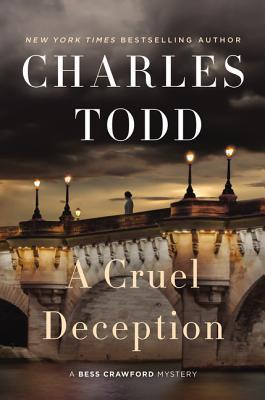 A Cruel Deception (Bess Crawford, #11) by
A Cruel Deception (Bess Crawford, #11) by  Escape Rating B: As I said at the top, this is a story about being in limbo. There are just too many things that are very much up in the air, and Bess’ investigation into Minton’s circumstances are just one of the many, many things that are hanging.
Escape Rating B: As I said at the top, this is a story about being in limbo. There are just too many things that are very much up in the air, and Bess’ investigation into Minton’s circumstances are just one of the many, many things that are hanging. A Forgotten Place (Bess Crawford, #10) by
A Forgotten Place (Bess Crawford, #10) by 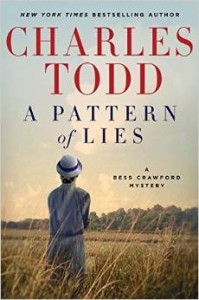 The atmosphere of this particular story will remind series readers of an earlier story,
The atmosphere of this particular story will remind series readers of an earlier story, 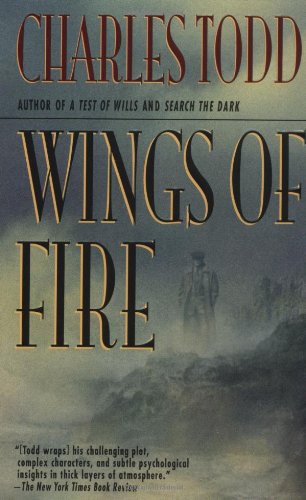 Wings of Fire (Inspector Ian Rutledge, #2) by
Wings of Fire (Inspector Ian Rutledge, #2) by 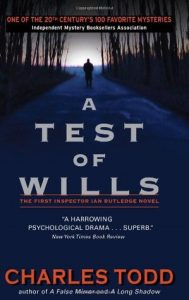 I’ve been looking for comfort reads this week, and that has led me to take a look at some mystery series that I’ve been meaning to get caught up on. Today, that led me to Wings of Fire, the second book in Charles Todd’s
I’ve been looking for comfort reads this week, and that has led me to take a look at some mystery series that I’ve been meaning to get caught up on. Today, that led me to Wings of Fire, the second book in Charles Todd’s 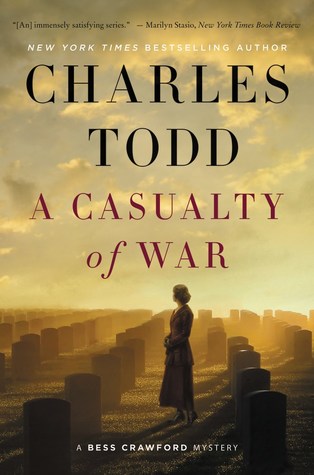 A Casualty of War (Bess Crawford #9) by
A Casualty of War (Bess Crawford #9) by  The Piper: An Inspector Ian Rutledge Story by
The Piper: An Inspector Ian Rutledge Story by 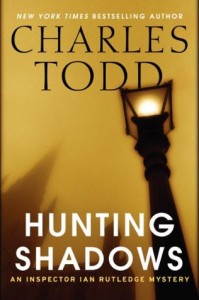 Hamish is an interesting character, whether readers are familiar with the series or not. I’ve read the first book (
Hamish is an interesting character, whether readers are familiar with the series or not. I’ve read the first book ( The Shattered Tree (Bess Crawford, #8) by
The Shattered Tree (Bess Crawford, #8) by 